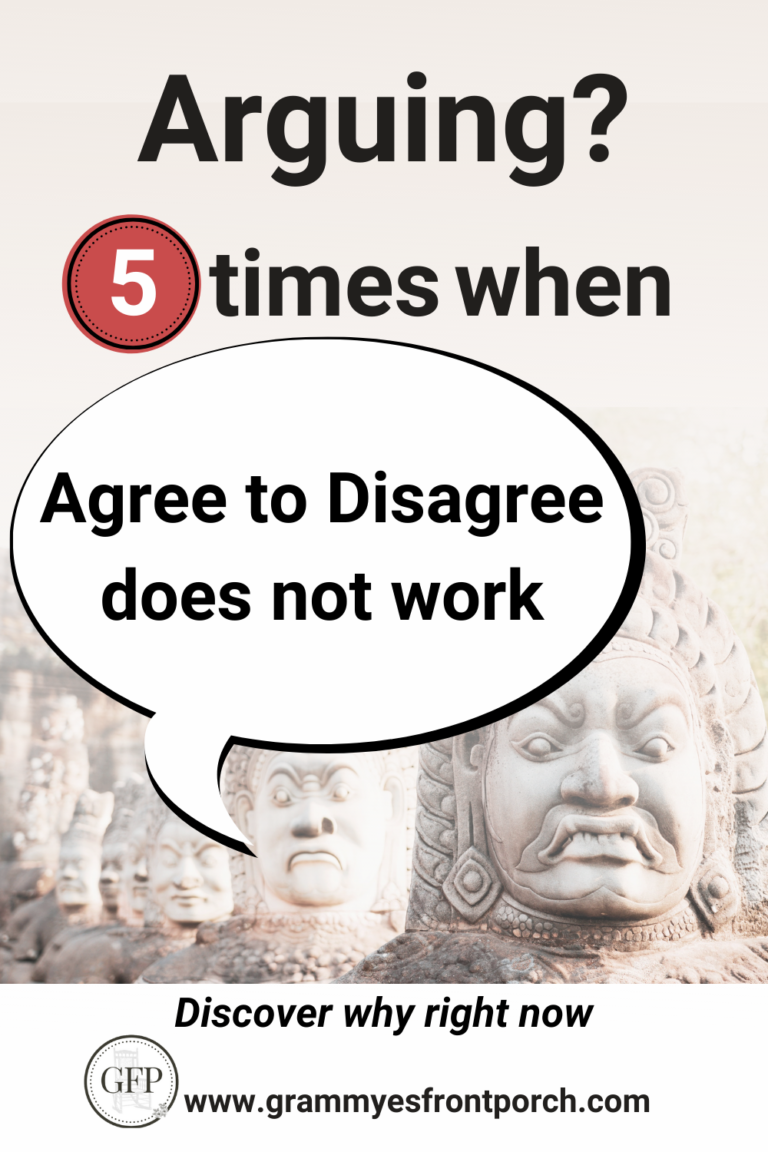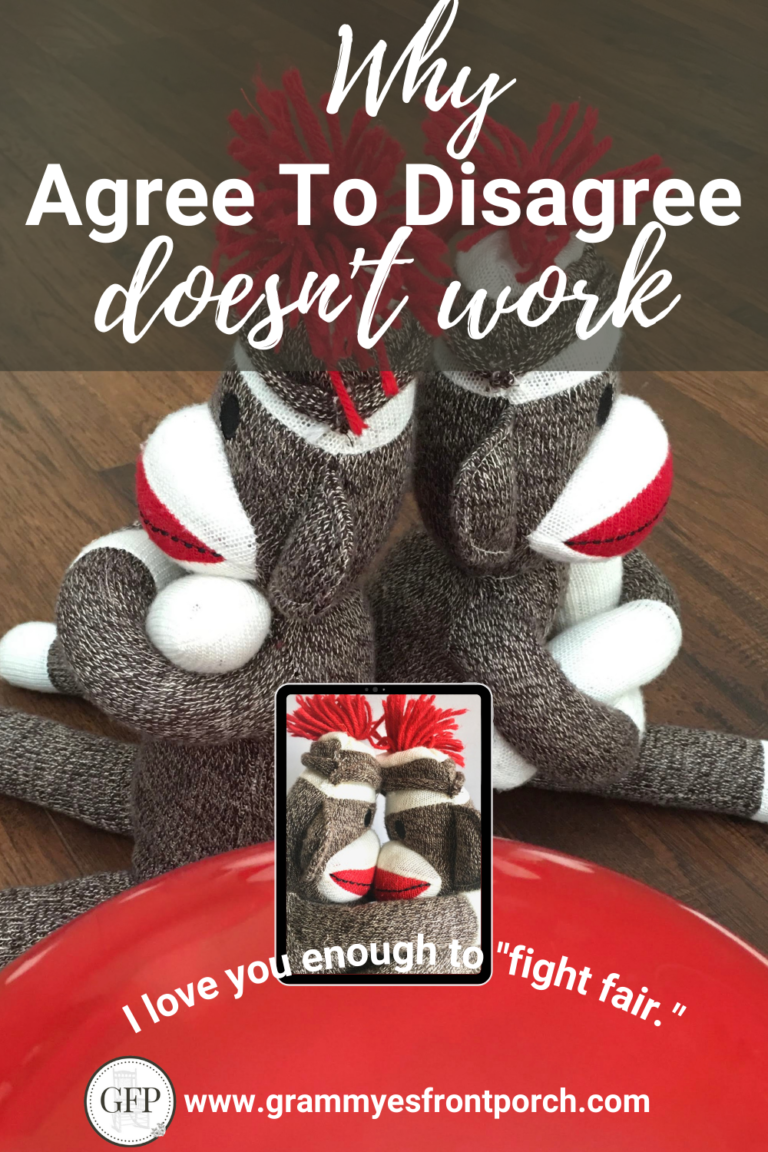May 23, 2020
Updated Apr 6, 2022
Agree to disagree doesn’t work in these five situations. Learn when it’s okay and when it’s not. And become a kinder and better negotiator in the process.

Agree To Disagree Doesn’t Work
You know how it feels when someone drops the wrong phrase on you unexpectedly? You can’t even respond! This is one of those phrases.
“Let’s just agree to disagree.”
It has a place.
😠 But used incorrectly, it feels like a sock got stuffed in your mouth right in the middle of an important discussion.
It’s perfectly okay to say it when you’re comparing your opinions. For instance, you like to travel by plane and think it’s the best. Your sister gets violently sick on planes and will never fly; she prefers walking everywhere.
It’s okay to say it then, I promise. Because it’s okay not to have the same favorite things, and even okay to feel your opinion is the more correct one.
However, if it’s time for you and your sister to go somewhere together and you have to leave right now, this Agree To Disagree “pretend ending” will not serve you. Because you have to agree to leave, you have to agree on how to get there, and you have to agree on the destination.
So let’s explore a few times you shouldn’t use it.
These five things are merely an introduction to a very long journey into reasoning and negotiating. There is so much there. So just this little bit for today.
Remember, I’m not correcting you.
I’m just helping you cross off one option on your multiple-choice solutions. This will help guide you in your discussions with people around you.
Take a quick look at the five situations, then a further explanation that may be something you can use the next time it comes up.


Agree To Disagree Doesn’t Work in Five Situations.
- When the issue is a joint venture.
- When the issue is a spiritual matter.
- When a deeper issue is unresolved.
- When the parties are not equal in power.
- When it is a parenting issue.
🕐
One: When the issue is a joint venture.
Doing something together requires agreement.
“Agree to disagree” in this case is very likely a postponement or an abandonment.
In other words, it is likely the issue will return, to be dealt with later. Ultimately the choices will be to
(1) agree
(2) abandon the venture.
What are we talking about? I’ll get you started.
- Which car should we take?
- What is our signal to lift this heavy sofa?
- Are we ready to leave for vacation?
“Agree to disagree” will not help you reach a decision when it’s time to do something together.
Joint ventures require agreement.
🕑
Two: When the issue is a spiritual matter.
You can’t live by two truths. You can pretend, but it simply won’t work.
Mutually exclusive standards are by nature in opposition to each other. (I know. That sentence is like saying “Blue things are blue.”)
Spiritual truths require adherence, and conflicting “truths” can’t be followed.
This is why “Co-exist” bumper stickers make people crazy. I’m just going to say mutually exclusive again. If someone is telling you this can work, it can’t. If you’re still not convinced, show this article to your mom and ask her. Moms always know what doesn’t work.
You can’t live by two truths.
🕒
Three: When a deeper issue is unresolved.
These “back-away” tactics won’t resolve complex issues.
If you’re in a deep conflict over emotional or spiritual issues, or if some kind of betrayal is in the picture, you need time. In this situation the journey to resolution is usually not simply a straightforward one-time discussion.
You need time to resolve the bigger issue, the emotional underlying issue, which just doesn’t get settled ever with “Agree To Disagree.”
You probably feel like you want to back each other into a corner and experience a “win” but it’s likely to be short-lived. “Agree To Disagree” may be just a trap door that gets used to escape the discussion. Someone may use it, but it’s not the answer.
Because back-away tactics don’t resolve complex issues.
🕓
Four: When the distribution of power is not equal.
Someone really has the final word.
If you’re the one in power, it’s only fair to tie one hand behind your back if you want an honest argument.
And if you’re the lesser power, respect and restraint will temper your contribution to the discussion.
One thing is pretty certain: The “Agree To Disagree” ending will not go well in this situation.
It is either
- a warning of an upcoming settlement by force,
- or an expression of insubordination.
If you are in this situation having a disagreement on something of significance, you will not be served by the “Agree To Disagree” false resolution.
Because someone has the final word.
🕔
Five: When it is a parenting issue.
Parents need to unite and set permissions in a systematic way. You simply cannot function as a parent by both allowing and disallowing an action.
Furthermore, many decisions about upbringing are mutually exclusive (see number two). You can’t send a child to both public and private school at the same time. He can’t be on vacation and at the ball tournament at the same time. She can’t be raised as Baptist and Buddhist. Your child can’t wear both the cowboy boots and the sneakers. No one can ride a bike outdoors and watch television indoors simultaneously.
Parents have to make the right choice on matters of importance. Children may be allowed to make decisions that are simply inconsequential preferences. But in all these, a decision will be made.
Parents need to unite and set permissions in a systematic way.
Regarding “Agree to Disagree”…
- Sometimes it’s about right and wrong.
- Sometimes it’s simply that a decision must be made.
And that fact is really the heart of the matter:
A decision must be made.
How does that make you feel? Some people are afraid of decisions. Some have a strong need to be the winner in a decision-making discussion. Some feel it’s necessary to put up a good fight. And thus we argue.
And I’ll say something that may surprise you: Arguing can be good.
Arguing
An argument has a purpose:
- To get to the truth.
- To establish what is fair.
- To introduce a point of view.
- To settle a dispute.
- To make a decision
Generally arguments fall under one of these four categories:
- Inquiry
- Conviction
- Persuasion
- Negotiation.
I’ve got a link below to a great article about this.
But right here, let’s talk about the right way to do it.
And this is important.
If you’re really going to argue, bring your “A-game” and be serious. No insults, no unfair comparisons, no past offenses.
And have some mercy. There are times when someone just gets tired of arguing. And if you’re a “super arguer” you have to let them rest
About kindness, an admonition:
Arguments with the purpose of insulting or winning at all costs will be damaging and counterproductive.
If you’re truly working with another person to evaluate a situation and reach the best outcome,
then do that.
We all bring something to the table — past experience, knowledge, practicality.
We all have a seat there, offering our opinion and helping shape the direction.
You have something no one else has: You have you. That’s your unique set of circumstances, your unique history, your unique perspective, your unique gifts.
It’s why you’re here,
placed where you are,
interacting with others
in a constructive way,
and helping drive decisions
that lead to the best outcomes.


Whew.
So there’s a very tiny peek into the fascinating world of arguing, negotiating, and relationships.
You’re not going to get in trouble for saying “Let’s agree to disagree.” Sometimes it’s a reasonable assessment of a difference of opinion.
But it’s the wrong tool to bring when a decision must be made.
If we’re going to drive a decision, then let’s do it with clarity, kindness, and purpose.
Please help me remember this.
If you’d like to indulge in an article that is very helpful in describing the good purpose of arguments, check out Lumen Learning’s Four Aims of Argument. It’s more academic, but very straightforward.
You want more about relationships? I’ve got a few posts, including How Can I Make My Relationships Better, What You Don’t See, and a few others.
If you’d like more serious resources, try a book:
How To Win Friends and Influence People, by Dale Carnegie. It’s old, but insightful.
So many great books have helped me set a course, it’s impossible to name them all.
Learning to truly care about others means learning to truly care about others. And we need to.
But really, what we want is to get to the deeper intention.
❓
We need to know the “why” in what we do.
Why are we arguing in relationships anyway? For the reasons above, for sure.
But something more: We want agreement, harmony, and shared ventures. We want companionship and encouragement, and we want to invest in meaningful ways.
If we can connect our words and actions to what is important, the end goal, then we have a clearer picture of how to discuss different views.
Matthew 22:36-40 says this:
“Teacher, what is the greatest commandment in the law? “
And He said to him,
“You shall love the Lord your God with all your heart and with all your soul and with all your mind. This is the great and first commandment.
And a second is like it:
You shall love your neighbor as yourself.
On these two commandments depend all the law and the prophets.”
We hear this from many sources, and we know it. But we seldom read the last line.
Everything depends on this.
How important is that?
And can I align my life to follow this?
And what would happen then?
Is love driving my conversations?
(If you’d like to read more on these verses, check this link to an excellent article by Phil Johnson at Ligonier Ministries.)
You! You came to read, and you brought your unique circumstances, history, perspective and gifts here. Thank you.
And about “Agree To Disagree”–
If this happens to you now, if someone says “Let’s just agree to disagree” at a time when it doesn’t apply,
I hope you’ll recognize why it’s wrong and you can try to understand why it was said.

Hey — did you notice?
Both commandments start the same way: “You shall love.”

Thank you! At GFP company is always welcome!
If you liked this topic 🤗, feel free to 👉 share 👈 on Facebook or Pinterest, or send a link to a friend.
Are you on Pinterest? That is a crazy fun place! You can find so many helpful things. Take a look at what I’ve saved for you! A lot of things that never make it to the blog. Here are my Pinterest pins, and I also have categories/boards if you’re looking for something specific.

Would you like access to the Subscriber Resource Library here at GFP? All the recipes, Scripture printables, etc., are available there, at no cost. Subscribers receive a password to access the library.
-Grammye
I’m Grammye, and I’m collecting and sharing ideas that can help you embrace the life you have.
When things are difficult, come here to refresh and relax. We’ll have coffee and talk.
You’re invited
to the neighborhood of GFP.
Accept by signing up
and I’ll send you a letter right away.

This post may contain affiliate links. That’s a good thing. It means if you purchase a product I’ve highlighted, the seller may compensate me for that promotion. I love to share products that are a good value and make life easier. Those little commissions may add up, and can help to offset the cost of running the blog. Or maybe even create a little income. Click here to learn more about this.
